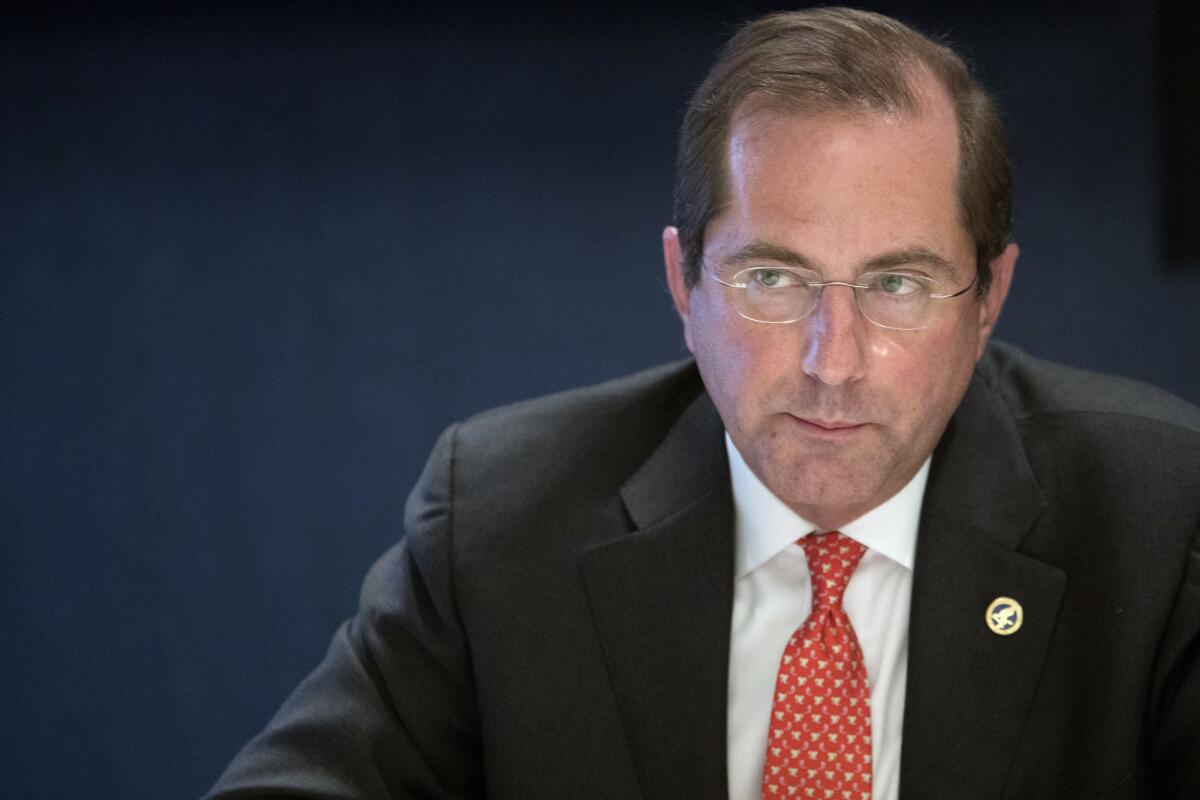Trump administration to consider plans to import prescription drugs from Canada

- Share via
WASHINGTON — The Trump administration — under mounting pressure to lower prescription drug prices ahead of next year’s elections — announced plans Wednesday to consider allowing states to import lower-priced medications from Canada.
The move, long advocated by consumer groups and opposed by the pharmaceutical industry, will not immediately clear the way for widespread importation.
Nor is it clear when consumers would be able to access cheaper prescriptions.
But the announcement by Health and Human Services Secretary Alex Azar signaled a new urgency by the administration to show progress on one of the president’s signature 2016 campaign promises.
Despite lofty rhetoric and claims he was getting tough on drugmakers, President Trump has thus far been unable to deliver meaningful relief to patients, with Americans continuing to pay the world’s highest prices for medicines.
In July, the administration was forced to withdraw a proposal to impose new restrictions on the rebates that drug companies pay to pharmacy benefit managers in Medicare. Critics say these rebates inflate drug prices.
Previous administrations have resisted calls to import drugs from abroad, echoing warnings from the pharmaceutical industry that it could expose patients to risks from counterfeit or substandard medicines.
But Azar, a former drug industry executive who once dismissed drug importation as a gimmick, said Wednesday that U.S. patients will be able to import medications safely and effectively, with oversight from the Food and Drug Administration.
“For too long American patients have been paying exorbitantly high prices for prescription drugs that are made available to other countries at lower prices,” Azar said in a statement that credited Trump for pushing the idea.
The administration’s move drew praise from Senate Finance Committee Chairman Charles E. Grassley (R-Iowa), who has been pushing legislation to rein in drug prices in the U.S., which are far and away the highest in the world.
AARP applauded the importation proposal. “There is a crisis in drug prices, and the safe, legal importation of less expensive prescription drugs is one step that will help lower costs and add competitive pressure on drugmakers,” said Nancy LeaMond, AARP executive vice president.
It’s widely believed among experts that drug importation will not alone solve the drug-pricing crisis, and several consumer advocates called Wednesday for more aggressive steps to confront the industry.
“Importing medicine is no national solution to our crisis of unaffordable medicine at home,” said Peter Maybarduk, director of Public Citizen’s Access to Medicines Program. “Our government needs to challenge the power of drugmakers head on, beginning by negotiating prices directly on behalf of Medicare.”
As a candidate in 2016, Trump called for Medicare to use its market power to secure lower prices for the millions of seniors and disabled Americans who rely on the government health plan.
But his administration has thus far resisted taking steps to do this, even though most other wealthy countries directly or indirectly regulate the prices their citizens pay for pharmaceuticals.
And just weeks ago, Republicans on the Senate Finance Committee killed an effort by Democrats to include a Medicare negotiation provision in a drug-pricing bill the committee developed.
If finalized, the administration’s importation proposal would allow states, wholesalers and pharmacists to get FDA approval to import certain medications from Canada that are also available in the U.S.
Canada’s drug prices, though often lower than those in the U.S., are still typically higher than in Western European nations.
Many U.S. patients take relatively lower priced generic drugs to manage conditions such as high blood pressure or elevated blood sugar.
But the advent of expensive specialty medications for cancer and other diseases have pushed up costs dramatically at the same time that many drugmakers have raised prices on long-available drugs such as insulin, a crucial medication for patients with diabetes.
Just this week, Sen. Bernie Sanders (I-Vt.), who is seeking the Democratic presidential nomination, said he took a group of diabetes patients to Canada to buy lower-priced insulin to dramatize the problem.
And across the country, other Democratic presidential hopefuls have been hammering Trump for not doing more to bring drug prices under control.
Trump is supporting a Senate bill to cap medication costs for Medicare recipients and require drugmakers to pay rebates to the program if price increases exceed inflation.
And the president has backed a Florida law allowing state residents to gain access to medications from Canada.
But Democrats in the House are still pressing for a vote on a bill allowing Medicare to directly negotiate prices on behalf of millions of seniors enrolled in the Part D prescription drug plan.
Separately, the Trump administration is pursuing a regulation that would tie what Medicare pays for drugs administered in doctors’ offices to lower international prices.
More to Read
Get the L.A. Times Politics newsletter
Deeply reported insights into legislation, politics and policy from Sacramento, Washington and beyond. In your inbox three times per week.
You may occasionally receive promotional content from the Los Angeles Times.











